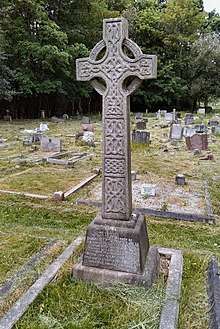Richard Blunt
Richard Frederick Lefevre Blunt was the first Anglican Bishop of Hull in the modern era; and served from 1891 until his death in 1910.
Life

St Andrew's Church, Ham
Born in 1833 and educated at Merchant Taylors' and King's College London,[1] his first post after Ordination was as a Curate at St Paul, Cheltenham.[2] After serving as vicar of Scarborough[3] and Archdeacon of the East Riding (1873–1891) he was elevated in 1891 to the Episcopate as a Suffragan to the Archbishop of York.[4]
He was vicar of All Saints, Hessle (near Hull) from 1905 to 1910. He died on 23 January 1910 and is buried at St Andrew's Church, Ham.
Notes
- “Who was Who” 1897–1990 London, A & C Black, 1991 ISBN 0-7136-3457-X
- Church web site
- Area details Archived 2013-09-28 at the Wayback Machine
- The Times, Friday, 20 March 1891; p. 5; Issue 33277; col E The Ven. Richard Frederick Lefevre Blunt
| Church of England titles | ||
|---|---|---|
| Vacant Title last held by Robert Sylvester |
Bishop of Hull 1891–1910 |
Succeeded by John Augustine Kempthorne |
gollark: Also, *do* you have the video uploaded now (for purposes)?
gollark: I can test THAT on my laptop ish.
gollark: And possibly computer vision.
gollark: Yes, I'm going to investigate higher powered/better motors.
gollark: I realized it would be annoying to carry and I couldn't do much with it.
This article is issued from Wikipedia. The text is licensed under Creative Commons - Attribution - Sharealike. Additional terms may apply for the media files.